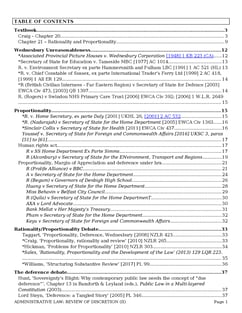Judgement for the case Racal
Table Of Contents
DPP made an application to investigate a company’s record on the grounds that it had sent fraudulent messages to customers.
The high court judge said that since the section only applied to the internal management of the company he would not grant the application. The legislation stated that the decision of the high court was to be the final decision on such an application and therefore not capable of appeal.
Nevertheless the DPP appealed on the Pearlman grounds, saying that the judge’s misconstruction of the statute was a jurisdictional error of law, since a correct construction of s.441 was collateral to making a decision.
-
HL held that when a power to decide a particular question was conferred by statute on a court of law, as distinct from a tribunal of limited jurisdiction, there was no presumption that Parliament did not intend to confer on it a power to determine questions of law going to its jurisdiction as well as questions of fact and judicial review was not available to correct any error of law made by it.
Hence the appeal was dismissed.
Lord Diplock
He that the breakthrough made in Anisminic, where parliament conferred a power of determination on tribunals, was that “as respects administrative tribunals and authorities, the old distinction between errors of law that went to jurisdiction and errors of law that did not was for practical purposes abolished.”
Any error of law made in reaching their decision would render the decision a nullity.
However he said that the jurisdictional/non-jurisdictional distinction survived in general for lower courts of law where parliament conferred on the court a specific/limited power of determination. The reason for the different treatment of tribunals and lower courts is that there is a presumption (that it is possible to overturn by explicit statutory language) that parliament did not intend to give law-interpreting powers on lay tribunals, whereas clearly such a presumption does not apply to the courts.
However, there is also a distinction between lower courts, whose power of interpretation may be limited by statute, and high courts, which have a constitutional role necessarily entailing interpretation of statute.
Hence there is no room for the inference that parliament did not intend the high court to interpret the words of a statute (per Lane LJ’s criticism in Pearlman).
Hence judicial review is only available against the decisions of lower courts, whereas high court decisions can only be appealed by application to an appellate court.
SUMMARY
It is presumed that any type of error of law can render a tribunal’s decision null; it is presumed that only jurisdictional errors of law can render a lower court’s decision null; no error of law can render a high court’s decision null (absolute rule).
----
Beatson, Matthews and Elliott (BME): Are the distinctions appropriate? Should the mere label of “court” make the difference? Some tribunals will have specialist expertise in an area of law, whereas some county courts might have no legal knowledge on the specific matter. This probably depends on the strength of the presumptions.
RELATED CASES
For Further Study on Racal
Need instant answers? Our AI exam tutor is here to help.
Ask questions 🙋 Get answers 📔 It's simple 👁️👄👁️
Our AI is educated by the highest scoring students across all subjects and schools. Join hundreds of your peers today.
Get StartedSimilar Cases
Related Product Samples
These product samples contain the same concepts we cover in this case.

